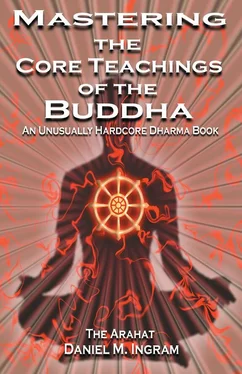Daniel Ingram - Mastering the Core Teachings of Buddha - An Unusually Hardcore Dharma Book
Здесь есть возможность читать онлайн «Daniel Ingram - Mastering the Core Teachings of Buddha - An Unusually Hardcore Dharma Book» весь текст электронной книги совершенно бесплатно (целиком полную версию без сокращений). В некоторых случаях можно слушать аудио, скачать через торрент в формате fb2 и присутствует краткое содержание. Год выпуска: 2009, ISBN: 2009, Издательство: Aeon Books, Жанр: Старинная литература, на русском языке. Описание произведения, (предисловие) а так же отзывы посетителей доступны на портале библиотеки ЛибКат.
- Название:Mastering the Core Teachings of Buddha - An Unusually Hardcore Dharma Book
- Автор:
- Издательство:Aeon Books
- Жанр:
- Год:2009
- ISBN:9781904658405
- Рейтинг книги:5 / 5. Голосов: 1
-
Избранное:Добавить в избранное
- Отзывы:
-
Ваша оценка:
- 100
- 1
- 2
- 3
- 4
- 5
Mastering the Core Teachings of Buddha - An Unusually Hardcore Dharma Book: краткое содержание, описание и аннотация
Предлагаем к чтению аннотацию, описание, краткое содержание или предисловие (зависит от того, что написал сам автор книги «Mastering the Core Teachings of Buddha - An Unusually Hardcore Dharma Book»). Если вы не нашли необходимую информацию о книге — напишите в комментариях, мы постараемся отыскать её.
Mastering the Core Teachings of Buddha - An Unusually Hardcore Dharma Book — читать онлайн бесплатно полную книгу (весь текст) целиком
Ниже представлен текст книги, разбитый по страницам. Система сохранения места последней прочитанной страницы, позволяет с удобством читать онлайн бесплатно книгу «Mastering the Core Teachings of Buddha - An Unusually Hardcore Dharma Book», без необходимости каждый раз заново искать на чём Вы остановились. Поставьте закладку, и сможете в любой момент перейти на страницу, на которой закончили чтение.
Интервал:
Закладка:
When he came back, the benefits of his practice were obvious, and a few years later I began to try to follow a similar path.
In 1994, I began going on intensive meditation retreats and doing a lot of daily practice. I also ran into some very odd and interesting experiences, and began to look around for more guidance on how to proceed and keep things in perspective. Good teachers were few and far iv
Foreword and Warning
away, their time limited and often expensive to obtain, and their answers to my questions were often guarded and cryptic. Even my old music friend was keeping most of what he knew to himself, and issues around disclosure of meditation theory and personal practice details nearly cost us our friendship.
Frustrated, I turned to books, reading extensively, poring over texts both modern and ancient looking for conceptual frameworks that might help me navigate skillfully in territory that was completely outside my previous experience. Despite having access to an astounding number of great and detailed dharma books, I found that they left out lots of details that turned out to be very important. I learned the hard way that using conceptual frameworks that were too idealistic or that were not fully explained could be as bad as using none at all. Further, I found that much of the theory about progress contained ideals and myths that simply did not hold up to reality testing, as much as I wanted them to.
I also came to the profound realization that they have actually worked all of this stuff out. Those darn Buddhists have come up with very simple techniques that lead directly to remarkable results if you follow instructions and get the dose high enough. While some people don’t like this sort of cookbook approach to meditation, I am so grateful for their recipes that words fail to express my profound gratitude for the successes they have afforded me.
Their simple and ancient practices revealed more and more of what I sought. I found my experiences filling in the gaps in the texts and teachings, debunking the myths that pervade the standard Buddhist dogma and revealing the secrets meditation teachers routinely keep to themselves. Finally, I came to a place where I felt comfortable writing the book that I had been looking for, the book you now hold in your hands.
This book is for those who really want to master the core teachings of the Buddha and who are willing to put in the time and effort required. It is also for those who are tired of having to decipher the code of modern and ancient dharma books, as it is designed to be honest, explicit, straightforward and rigorously technical. Like many of the commentaries on the Pali Canon, it is organized along the lines of v
Foreword and Warning
the three basic trainings that the Buddha taught: morality, concentration and wisdom.
Throughout this book I have tried to be as utilitarian and pragmatic as possible, and the emphasis is always on how to actually “get it” at the level that makes some difference. All sections also assume to some degree that you have a practice of some sort, hang out in some sort of spiritual scene, and know a bit of the standard dharma lingo. All sections also assume that you are willing to do the work.
I have tried to include enough information to make this book capable of standing on its own as a manual of meditation and for walking the spiritual path. However, I have also tried to focus on those areas that I consider to be my core competencies and also those areas of the spiritual path that I do not feel have been adequately covered in the works that have come before this one. This book shines in areas of technique and the fine points of very high-level practice. However, the spiritual life is vast beyond measure and cannot possibly be adequately covered in a single book. Thus, I will often refer you to other excellent sources for more details on those topics that I feel have already been covered quite well by other authors. I strongly suggest checking out at least some if not all of these other sources.
Like my own practice, this book is heavily influenced by the teachings of the late, great Mahasi Sayadaw, a Burmese meditation master and scholar in the Theravada Buddhist tradition, and by those in his lineage and outside it. There are numerous references to other excellent traditions as well, some Buddhist and some not. It is my sincere wish that all diligent students of meditation find something in this book that is of practical value to them.
I have included a few of my own experiences and labeled them as such. This is done to try to add some sense of the reality of what is possible, both in terms of successes and failures. They should add a human dimension to the theory. However, if you find that these stories get in the way, or if they seem to have too much of the quality of “let me tell you about my personal spiritual quest,” please do us both a favor and skip over them without a second thought.
I have also written this book in what is clearly my own voice. Those who have read this work who know me tell me that they can almost hear vi
Foreword and Warning
me saying it. I have also left in a lot of my neurotic stuff and made it as obvious as I can. I will assert that anyone who writes puts their stuff in there even if they try to hide it, so at least you should be able to see it clearly rather than it being hidden and covert. If you want a book that is just the straight dogma and theory without this sort of voice, there are lots to choose from and I will mention a number along the way.
I have also included a modicum of social commentary, some of which has a definite bite to it. Some of you may not find it helpful, or even find it quite distasteful and offensive. Some of you will quickly dismiss it as harsh or wrong speech. I am torn between the feeling that there really are some important points in those sections and the understanding that not everyone will be able to make good use of information and opinions presented in such strong terms. Thus, I ask you to please skip over those chapters and get to the friendlier or more technical sections beyond them if you don’t find them helpful. To facilitate doing so, I have included a star (asterisk) in the titles of those chapters that contain potentially inflammatory material so that they may be treated appropriately.
While I feel that the points made in those chapters are important and potentially quite valid and useful, they are not absolutely necessary for understanding the chapters that follow them. The world is brimming with very nice and friendly dharma books. There are hundreds available on the shelves of any mega-bookstore. However, I believe that there is room for a book that sometimes conveys its message in a very different voice, though I respectfully give you the option to choose how much of that voice you want to hear. It is the unrestrained voice of one from a generation whose radicals wore spikes and combat boots rather than beads and sandals, listened to the Sex Pistols rather than the Moody Blues, wouldn’t know a beat poet or early ‘60s dharma bum from a hole in the ground, and thought the hippies were pretty friggin’ naïve, not that we don't owe them a lot. It is also the unrestrained voice of one whose practice has been dedicated to complete and unexcelled mastery of the traditional and hardcore stages of the path rather than some sort of vapid New Age fluff or pop psychological head-trip. If that ain’t you, consider reading something else.
vii
Foreword and Warning
As a highly regarded senior meditation teacher and scholar (who will remain anonymous) said to me after skimming through an earlier draft of this book, “Most Buddhists are just aging Boomers who want to do something to feel better about themselves as they get older and are not really interested in this sort of thing.” I wish them great success in getting those valid needs met and so I must reluctantly advise such individuals to avoid reading this book or at least the chapters marked with a star.
Читать дальшеИнтервал:
Закладка:
Похожие книги на «Mastering the Core Teachings of Buddha - An Unusually Hardcore Dharma Book»
Представляем Вашему вниманию похожие книги на «Mastering the Core Teachings of Buddha - An Unusually Hardcore Dharma Book» списком для выбора. Мы отобрали схожую по названию и смыслу литературу в надежде предоставить читателям больше вариантов отыскать новые, интересные, ещё непрочитанные произведения.
Обсуждение, отзывы о книге «Mastering the Core Teachings of Buddha - An Unusually Hardcore Dharma Book» и просто собственные мнения читателей. Оставьте ваши комментарии, напишите, что Вы думаете о произведении, его смысле или главных героях. Укажите что конкретно понравилось, а что нет, и почему Вы так считаете.












